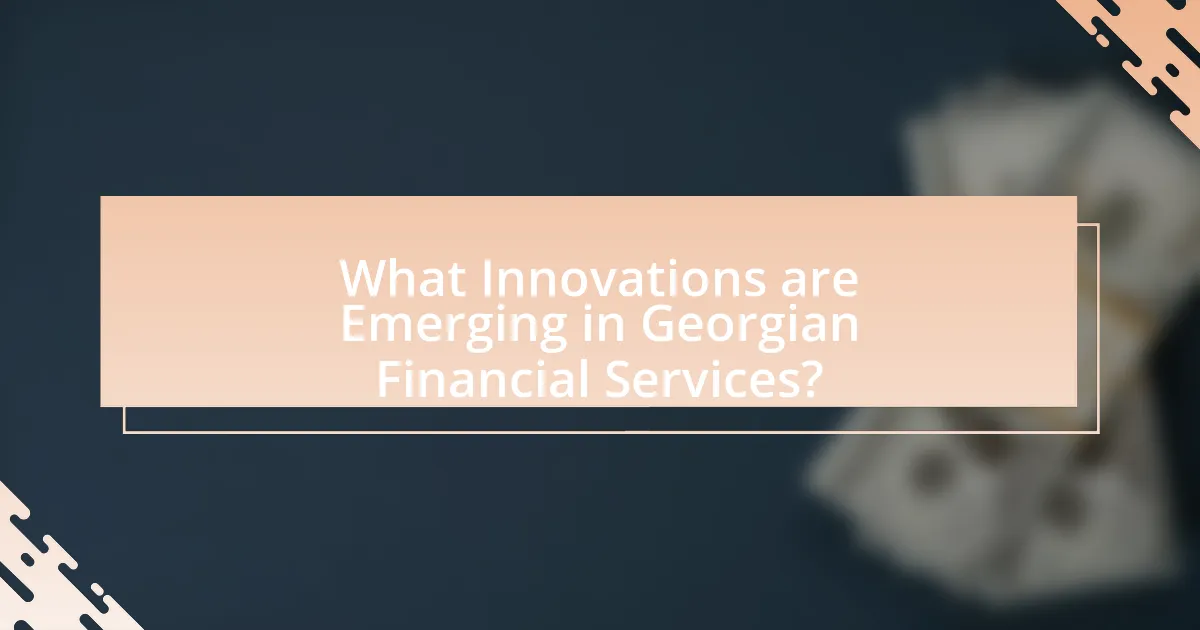Sustainable banking practices in Georgia focus on integrating environmental, social, and governance (ESG) criteria into financial decision-making, with banks adopting green financing initiatives such as loans for renewable energy projects. Key principles include environmental stewardship, social responsibility, and economic viability, which enhance financial performance and promote long-term profitability. The article explores the differences between sustainable and traditional banking methods, the impact of technological innovations, and the challenges faced by Georgian banks in implementing sustainable practices. It also highlights the importance of stakeholder engagement, regulatory frameworks, and customer education in advancing sustainable banking initiatives within the Georgian financial sector.

What are Sustainable Banking Practices in Georgia?
Sustainable banking practices in Georgia include the integration of environmental, social, and governance (ESG) criteria into financial decision-making processes. Georgian banks are increasingly adopting green financing initiatives, such as offering loans for renewable energy projects and energy-efficient buildings. For instance, the Bank of Georgia has launched a green loan program aimed at supporting sustainable development projects, reflecting a commitment to reducing carbon footprints. Additionally, the National Bank of Georgia has implemented regulations encouraging financial institutions to disclose their sustainability practices, promoting transparency and accountability in the banking sector. These practices are supported by the growing recognition of the importance of sustainability in the financial industry, aligning with global trends towards responsible banking.
How do these practices differ from traditional banking methods?
Sustainable banking practices differ from traditional banking methods primarily in their focus on environmental, social, and governance (ESG) criteria. Traditional banking typically prioritizes profit maximization and financial returns, often neglecting the broader impact of financial activities on society and the environment. In contrast, sustainable banking integrates ESG considerations into decision-making processes, promoting investments that support sustainable development and responsible resource management. For example, sustainable banks may offer green loans specifically designed to fund renewable energy projects, whereas traditional banks may not differentiate between types of loans based solely on their environmental impact. This shift reflects a growing recognition of the financial sector’s role in addressing climate change and social inequality, as evidenced by the increasing number of banks adopting sustainability frameworks and reporting standards, such as the Global Reporting Initiative.
What are the key principles of sustainable banking?
The key principles of sustainable banking include environmental stewardship, social responsibility, and economic viability. Environmental stewardship involves minimizing the ecological impact of banking operations and financing projects that promote sustainability, such as renewable energy initiatives. Social responsibility emphasizes the importance of ethical practices, community engagement, and equitable access to financial services. Economic viability ensures that banking practices are financially sound while supporting sustainable development goals. These principles are supported by frameworks like the UN Principles for Responsible Banking, which guide banks in aligning their strategies with societal goals and environmental sustainability.
How do sustainable practices impact financial performance?
Sustainable practices positively impact financial performance by reducing costs, enhancing brand reputation, and attracting investment. Companies that implement sustainable practices often experience lower operational costs due to increased efficiency and waste reduction. For instance, a study by the Harvard Business School found that firms with strong sustainability initiatives outperform their peers in stock market performance, indicating a direct correlation between sustainability and financial success. Additionally, sustainable practices can improve customer loyalty and brand image, leading to increased sales and market share. According to a Nielsen report, 66% of consumers are willing to pay more for sustainable brands, further demonstrating the financial benefits of adopting such practices.
Why is sustainability important in the banking sector?
Sustainability is important in the banking sector because it enhances financial stability and promotes long-term profitability. Sustainable banking practices help mitigate risks associated with environmental, social, and governance (ESG) factors, which can impact financial performance. For instance, banks that adopt sustainable practices are better positioned to comply with regulatory requirements and attract socially conscious investors, leading to increased capital inflow. Additionally, a report by the Global Sustainable Investment Alliance indicates that sustainable investments reached $35.3 trillion in 2020, highlighting the growing demand for responsible banking. This trend underscores the necessity for banks to integrate sustainability into their core operations to remain competitive and resilient in a rapidly changing economic landscape.
What role does the banking sector play in environmental sustainability?
The banking sector plays a crucial role in environmental sustainability by financing green projects and promoting sustainable practices among businesses. Banks provide loans and investment opportunities for renewable energy, energy efficiency, and sustainable agriculture, which contribute to reducing carbon emissions and conserving natural resources. For instance, according to the Global Sustainable Investment Alliance, sustainable investment assets reached $35.3 trillion globally in 2020, indicating a significant shift towards environmentally responsible financing. Additionally, banks implement environmental risk assessments in their lending processes, ensuring that funded projects align with sustainability goals. This integration of environmental considerations into financial decision-making supports the transition to a low-carbon economy and fosters long-term ecological balance.
How can sustainable banking contribute to social equity?
Sustainable banking can contribute to social equity by providing equitable access to financial services for underserved communities. By prioritizing investments in social and environmental projects, sustainable banks can help reduce economic disparities and promote inclusive growth. For instance, according to the Global Sustainable Investment Alliance, sustainable investments reached $35.3 trillion in 2020, indicating a growing trend towards financing initiatives that support social equity. Additionally, sustainable banking practices often include offering lower interest rates and flexible loan terms to marginalized groups, which can empower them economically and socially.

What Innovations are Emerging in Georgian Financial Services?
Innovations emerging in Georgian financial services include the adoption of digital banking platforms, the integration of blockchain technology, and the implementation of sustainable finance initiatives. Digital banking platforms have gained traction, with institutions like TBC Bank and Bank of Georgia offering mobile apps that enhance customer experience and accessibility. Blockchain technology is being explored for improving transaction transparency and security, as evidenced by pilot projects in remittances and supply chain finance. Additionally, sustainable finance initiatives are being promoted, with banks increasingly focusing on green loans and investments that support environmental sustainability, aligning with global trends towards responsible banking practices.
How are Georgian banks implementing sustainable technologies?
Georgian banks are implementing sustainable technologies by integrating digital banking solutions that promote energy efficiency and reduce carbon footprints. For instance, several banks have adopted online banking platforms and mobile applications, which minimize the need for physical branches and paper-based transactions. Additionally, banks like TBC Bank and Bank of Georgia are investing in renewable energy projects and financing green initiatives, such as solar and wind energy developments, to support sustainable economic growth. These efforts are aligned with global sustainability goals and demonstrate a commitment to environmentally responsible banking practices.
What are the latest technological advancements in sustainable banking?
The latest technological advancements in sustainable banking include the integration of artificial intelligence (AI) for risk assessment and decision-making, blockchain technology for transparent transactions, and the use of big data analytics to enhance customer engagement and sustainability reporting. AI enables banks to analyze vast amounts of data to identify sustainable investment opportunities and assess environmental risks, improving overall decision-making processes. Blockchain technology ensures transparency and traceability in transactions, which is crucial for verifying the sustainability of investments. Additionally, big data analytics allows banks to tailor their services to promote sustainable practices among customers, thereby fostering a culture of sustainability in financial services. These advancements are supported by industry reports indicating a growing trend towards digital transformation in banking, with a focus on sustainability as a key driver for innovation.
How do these technologies enhance customer experience?
Technologies enhance customer experience in sustainable banking by providing personalized services, improving accessibility, and increasing efficiency. For instance, mobile banking applications allow customers to manage their finances anytime and anywhere, leading to greater convenience. Additionally, data analytics enables banks to tailor products and services to individual customer needs, fostering a more engaging and relevant banking experience. According to a report by McKinsey, banks that leverage technology effectively can improve customer satisfaction scores by up to 20%. This demonstrates that the integration of innovative technologies directly correlates with enhanced customer experiences in the financial sector.
What partnerships are being formed to promote sustainability?
Partnerships being formed to promote sustainability in Georgian financial services include collaborations between banks and environmental organizations, as well as alliances with technology firms focused on green innovations. For instance, Bank of Georgia has partnered with the United Nations Development Programme (UNDP) to enhance sustainable financing practices. This partnership aims to integrate environmental, social, and governance (ESG) criteria into banking operations, thereby promoting responsible investment. Additionally, partnerships with local startups specializing in renewable energy solutions are emerging, facilitating the financing of sustainable projects. These collaborations are crucial for advancing sustainable banking practices and fostering a greener economy in Georgia.
Which organizations are collaborating with banks for sustainable initiatives?
Organizations collaborating with banks for sustainable initiatives include the United Nations Environment Programme Finance Initiative (UNEP FI), the Global Reporting Initiative (GRI), and the International Finance Corporation (IFC). These organizations work with banks to promote sustainable finance practices, develop frameworks for responsible investment, and enhance transparency in environmental, social, and governance (ESG) reporting. For instance, UNEP FI has over 200 financial institutions as members, focusing on integrating sustainability into financial decision-making.
How do these partnerships influence policy and practice?
Partnerships in sustainable banking influence policy and practice by fostering collaboration between financial institutions, government entities, and non-governmental organizations to promote environmentally responsible practices. These collaborations lead to the development of regulatory frameworks that encourage sustainable investments, as seen in Georgia’s adoption of green finance initiatives. For instance, the partnership between the National Bank of Georgia and international organizations has resulted in guidelines that integrate sustainability into banking operations, thereby shaping lending practices and risk assessment models. This alignment of interests among stakeholders not only enhances compliance with international standards but also drives innovation in financial products aimed at sustainability, ultimately transforming the banking landscape in Georgia.

What Challenges do Georgian Banks Face in Adopting Sustainable Practices?
Georgian banks face several challenges in adopting sustainable practices, primarily due to limited regulatory frameworks, lack of awareness, and insufficient financial resources. The regulatory environment in Georgia does not yet fully support or incentivize sustainable banking, which hinders banks from integrating environmental, social, and governance (ESG) criteria into their operations. Additionally, many financial institutions lack the necessary knowledge and expertise to implement sustainable practices effectively, resulting in a gap in understanding the benefits of such initiatives. Furthermore, the financial constraints faced by these banks limit their ability to invest in sustainable technologies and practices, making it difficult to transition towards more sustainable operations.
What are the main barriers to implementing sustainable banking?
The main barriers to implementing sustainable banking include lack of regulatory frameworks, insufficient awareness among stakeholders, and limited access to sustainable investment opportunities. Regulatory frameworks are often underdeveloped, which hinders banks from adopting sustainable practices effectively. Additionally, many stakeholders, including customers and financial institutions, may lack awareness of the benefits of sustainable banking, leading to low demand for such services. Furthermore, access to sustainable investment opportunities is often restricted, limiting banks’ ability to finance environmentally friendly projects. These barriers collectively impede the transition to sustainable banking practices.
How do regulatory frameworks affect sustainable banking initiatives?
Regulatory frameworks significantly influence sustainable banking initiatives by establishing guidelines and standards that banks must adhere to in their operations. These frameworks promote transparency, accountability, and risk management related to environmental, social, and governance (ESG) factors. For instance, the European Union’s Sustainable Finance Disclosure Regulation mandates financial institutions to disclose the sustainability of their investments, thereby encouraging banks to integrate sustainability into their business models. This regulatory pressure can lead to increased investment in green projects and sustainable practices, as banks seek to comply with legal requirements and enhance their reputations. Additionally, regulatory incentives, such as tax breaks for green financing, can further stimulate sustainable banking initiatives, driving the sector towards more environmentally responsible practices.
What financial challenges do banks encounter when transitioning to sustainability?
Banks encounter several financial challenges when transitioning to sustainability, including the need for significant upfront investments in green technologies and infrastructure. These investments can strain financial resources, especially for smaller banks that may lack the capital to implement sustainable practices effectively. Additionally, banks face the challenge of adapting their existing portfolios to align with sustainability goals, which may involve divesting from high-carbon assets and investing in lower-carbon alternatives, potentially leading to short-term financial losses. Regulatory pressures also add complexity, as banks must navigate evolving compliance requirements related to environmental, social, and governance (ESG) criteria, which can incur additional costs. Furthermore, the lack of standardized metrics for measuring sustainability performance can hinder banks’ ability to assess risks and opportunities accurately, complicating their financial planning and decision-making processes.
How can these challenges be overcome?
To overcome challenges in sustainable banking practices within Georgian financial services, institutions can implement comprehensive training programs for staff on sustainability principles and practices. This approach ensures that employees are equipped with the necessary knowledge to promote and integrate sustainable practices into their operations. Additionally, adopting advanced technologies such as blockchain for transparency and efficiency can enhance trust and accountability in financial transactions. Research indicates that banks utilizing technology for sustainability report improved customer satisfaction and operational efficiency. Furthermore, collaboration with local communities and stakeholders can foster a shared commitment to sustainability, leading to innovative solutions tailored to local needs.
What strategies can banks adopt to enhance sustainability efforts?
Banks can enhance sustainability efforts by integrating environmental, social, and governance (ESG) criteria into their lending and investment decisions. This strategy allows banks to assess the sustainability impact of their financial activities, ensuring that they support projects that contribute positively to the environment and society. For instance, a report by the Global Sustainable Investment Alliance indicates that sustainable investment assets reached $35.3 trillion globally in 2020, reflecting a growing trend among financial institutions to prioritize sustainability. Additionally, banks can implement green financing initiatives, such as offering lower interest rates for renewable energy projects, which encourages businesses to adopt sustainable practices. By adopting these strategies, banks not only contribute to sustainability but also align with the increasing demand from consumers and investors for responsible banking practices.
How can stakeholder engagement improve sustainable practices?
Stakeholder engagement can significantly improve sustainable practices by fostering collaboration and aligning interests among various parties involved in financial services. Engaging stakeholders, such as customers, employees, regulators, and community members, allows organizations to gather diverse perspectives, identify sustainability challenges, and co-create solutions that are more effective and widely accepted. For instance, a study by the Global Reporting Initiative found that companies actively involving stakeholders in sustainability initiatives are 50% more likely to achieve their sustainability goals. This collaborative approach not only enhances transparency and accountability but also drives innovation in sustainable banking practices, ultimately leading to more responsible financial services in Georgia.
What are the best practices for sustainable banking in Georgia?
The best practices for sustainable banking in Georgia include integrating environmental, social, and governance (ESG) criteria into lending and investment decisions, promoting green financial products, and enhancing transparency in reporting sustainability metrics. Georgian banks are increasingly adopting ESG frameworks to assess risks and opportunities associated with climate change and social impact, which aligns with global sustainability trends. For instance, the National Bank of Georgia has encouraged financial institutions to adopt sustainable practices through guidelines and initiatives aimed at fostering responsible banking. Additionally, banks are developing green bonds and eco-loans to finance renewable energy projects, which supports the country’s transition to a low-carbon economy.
How can banks measure the impact of their sustainable initiatives?
Banks can measure the impact of their sustainable initiatives through key performance indicators (KPIs) that assess environmental, social, and governance (ESG) factors. These KPIs can include metrics such as carbon footprint reduction, percentage of green loans issued, and improvements in community engagement. For instance, a study by the Global Reporting Initiative indicates that organizations that implement ESG metrics can enhance transparency and accountability, leading to better stakeholder trust and investment. Additionally, banks can utilize sustainability reporting frameworks like the Global Reporting Initiative or the Sustainability Accounting Standards Board to systematically evaluate and communicate their sustainable practices’ effectiveness.
What role does customer education play in promoting sustainable banking?
Customer education plays a crucial role in promoting sustainable banking by empowering consumers with knowledge about environmentally friendly financial practices. Educated customers are more likely to choose sustainable banking options, such as green loans or eco-friendly investment products, which directly supports financial institutions’ efforts to adopt sustainable practices. Research indicates that informed consumers are 60% more likely to engage with sustainable financial products, demonstrating the impact of education on consumer behavior. By enhancing awareness and understanding of sustainability issues, customer education fosters a culture of responsible banking, ultimately leading to increased demand for sustainable services and products.